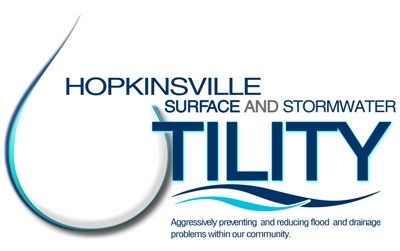HSSU Information
Stormwater is water from rain or melting snow that does not soak into the ground. Instead, it flows from rooftops, across paved areas, and through sloped lawns. As stormwater moves across these surfaces, it can pick up and carry along pollutants such as yard and pet waste, sediment, chemicals, oil, grease, and other possible contaminants. This water enters our community storm drains and flows directly, untreated, to Sanderson Creek, Blue Creek, or the Little River.
The City of Hopkinsville’s Stormwater Management Program is committed to the preservation and enhancement of citizens’ quality of life through water quality improvement, drainage infrastructure management, flood hazard minimization, and public awareness. An important part of stormwater management is to safeguard public health and protect the environment through the implementation of the U.S. EPA National Pollutant Discharge Elimination System U.S. EPA National Pollutant Discharge Elimination System Phase II Program.
Mandated by Congress under the Clean Water Act, the National Pollutant Discharge Elimination System (NPDES) Phase II is a national program for addressing sources of stormwater discharges which adversely affect the quality of our nation’s waters. By complying with the new federal regulations, the quality of our environment will be improved by reducing pollution to area’s rivers, streams, and lakes. The NPDES Phase II program requires the City of Hopkinsville to implement six minimum control measures (MCM) designed to prevent harmful pollutants from being washed by stormwater runoff into local waterbodies.
City of Hopkinsville’s Phase II Program
MCM 1: Public Education and Outreach
The first of six minimum control measures (MCM) required by the EPA, public education of stormwater runoff has been implemented in Hopkinsville since 2003. The City of Hopkinsville has been actively educating its citizens about stormwater runoff and pollution through a variety of ways including brochures, classes and activities for children and adults, ads on City TV Channel 12, and by labeling storm drains within the city with this colorful marker. Look for this marker as you walk or drive in Hopkinsville…its message is clear!
Information for Adults
MCM 2: Public Participation and Involvement
Volunteer today! Your group can help inform the citizens and visitors to Hopkinsville that the storm drains they see are not connected to a water treatment facility. In addition to labeling storm drains, there are also opportunities for picking up curbside trash, checking storm drains for maintenance needs, and also distributing informative flyers to local residences and businesses. If your group would like to participate, please contact Peter Wood at (270) 887-4035.
MCM 3: Illicit Discharge
…any discharge to a Municipal Separate Storm Sewer Systems (MS4) that is not composed entirely of stormwater…”
Examples of Illicit Discharges:
- Dumping anything except rainwater into a storm drain
- Outdoor washing activities that create flow to a storm drain
- Non-target irrigation from landscaping or lawns that reaches the storm drain system
- Spills that enter the storm drain system
- Industrial and commercial connections to the storm drain system
Did you know that one quart of motor oil can pollute over 1 million gallons of water?
Through ordinances and code enforcement, the City of Hopkinsville aims to eliminate illicit discharges into our storm drain system and thus reduce adverse impacts to our water quality. For example, City Ordinance 51.77 prohibits the construction of any connection to and the introduction of fill or debris into any part of our storm drain system. Hopkinsville’s newly adopted Ordinance 36-2007 further defines measures to prevent, detect, and eliminate illicit discharges. Ordinance 42-2007 lists the possible penalties for illicit discharge violations, currently $150.00 – $500.00 per day of offense plus recoverable costs.
Uncontrolled runoff from construction sites has a large, detrimental effect on our streams and rivers. To address this problem and comply with federal regulations, the City of Hopkinsville adopted the Erosion Prevention and Sediment Control (EPSC) Ordinance 37-2007 which describes sediment control measures for construction sites in Hopkinsville disturbing an area 2000 square feet or more. This ordinance uses technical guidelines in the most recent version of the Kentucky Best Management Practice Manual. Another useful resource for Best Management Practices is the Kentucky Erosion Prevention and Sediment Control Field Guide, available on the Kentucky Division of Conservation website. Contractors are required to have their own qualified EPSC inspector on-staff.
MCM 5: Post-Construction Runoff Control
With new development comes more impervious surfaces (e.g. parking lots, driveways, and rooftops), and significant measures must be implemented to protect receiving waterbodies from an increase of pollutants in stormwater runoff. Currently in Hopkinsville, City Ordinance 155 describes what is required by developers for stormwater management and control. Additionally, developers can view Stormwater Management Technical Guidelines to ensure sufficient and durable stormwater runoff controls. In the near future, a City of Hopkinsville Stormwater Design and Best Management Practices Manual outlining design criteria and maintenance responsibilities will be incorporated as part of the Phase II efforts.
If you are experiencing any drainage issues relating to stormwater facilities, you can report the drainage problem by contacting the Hopkinsville Surface and Stormwater Utility at (270) 887-4035 or visit the Utility online at hopkinsville-stormwater.com.
MCM 6: Pollution Prevention and Good Housekeeping
This measure requires the City of Hopkinsville to prevent or reduce pollutant runoff from municipal operations into our storm drain system. For example, city street sweepers keep the downtown streets clean and the storm drains free of trash and debris. This prevents pollutants from entering the storm drains and lessens the possibility of street flooding. Additionally, the City of Hopkinsville has implemented procedures for leaf pickup and the proper disposal of waste.
